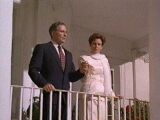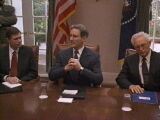Dave
1993 US
Dir: Ivan Reitman
Str: Kevin Kline, Sigourney Weaver, Frank Langella, Ben Kingsley



Dave shows us one of the most difficult problems of the modern
democracy in a very peculiar way.
One of the most difficult problems to solve inherent in the modern representive
democracy, I guess, probably lies in the aspect that it is certainly liable to foster indirectness and remoteness
in the public's mind especially in the case that the number of constituents belonging to a given constituency transcends
a certain threshold. We can find an excellent remark about this phenomenon in Christopher Alexander's book "A
Pattern Language", though he is essentially an architect. It tells "It is not hard to see why the government
of a region becomes less and less manageable with size. In a population of N persons, there are of the order of
N*N person-to-person links needed to keep channels of communication open. Naturally, when N goes beyond a certain
limit, the channels of communication needed for democracy and justice and information are simply too clogged, and
too complex; bureaucracy overwhelms human process.". In a very huge state, no one directly knows the representatives
any more who even if are to be considered to have been legitimately elected by the public. Legitimacy is a kind
of trick. For the fact that things could have been otherwise is easily obfuscated by an authoritative declaration
of legitimacy. Anyway, this indirectness and remoteness also seem to have been creating abstractness in political
matters and, as a result of this, indifferent attitude and apathy of the public toward political domain seem to
have become chronic and ubiquitous. When people lose direct contact with something, there is no doubt in that it
will become unavoidable that they will easily forget it altogether. Although we must admit that it's undoubtedly
true that the modern democracy is a great achievement in the history of human right, still there must be some problems
in it. Dave shows us these problems in a peculiar way. Because Dave present us with what-if scenario;
that is, what if someone who was a completely ordinary person became the president of the United States. Dave
is supposed to be a comedy, and actually it is, but it should be stressed that the reason why this movie has succeeded
in being an excellent comedy doesn't only reside in the comedic performances of players, but also resides in the
fact that the movie is comically showing the gap between what people think, in the terms of common knowledge, it
should be and what is actually happening in their real life, and the fact that it becomes apparent only after compared
to the opposite to what people think it should be that what people think it should be doesn't necessarily fit what
it actually should be, and, in spite of this, what actually it should be doesn't appear to be feasible because
the notion of what people think it should be dominates over everything else as a socially acquired and certificated
knowledge. I'll bet you must have got confused. In that case, I must say, as I'm not a native English speaker,
I'm not so good at expressing very complex notions in English. Therefore, I'm going to explain it gradually.
What's the story like?
Firstly, I should explain the plot. However, as to the story, I feel not so
many words are needed to explain it, for it's not so much complex a story, but rather schematic. Probably it could
be referred as a sort of the variation of the stories about mistook identity, but not exactly in the same meaning
as usually associated with Hitchcock movies where usually main characters are suffering from it. Considering the
fact that this kind of stories seldom miss the mark, and the director Ivan Reitman is fairly good at handling this
kind of light-weight comedies, it's natural for the movie to become a highly entertaining one. And, actually it
is. Anyway, the plot unfolds itself as following. The real president of the United States (played by Kevin Kline)
suddenly gets a stroke while he is pursuing his little furtive private pleasure. Therefore, suddenly his double
becomes needed to retain the semblance of everything being all right. Conveniently, they find one (also played
by Kevin Kline, no wonder they enormously resemble each other) who is actually a so-called ham. Though he is firstly
overwhelmed by the atmosphere of the White House, he gradually gathers popularity by doing what the real president
would never do, which I will explain later. His peculiar glory as the president of the United States culminates
in the scene where he declares an astonishing plan according to which all the people of the United States will
be able to get their own job. But, there always exists bad guys who try to debase other person's achievement in
any country and in any society. In this movie's case, it's the very guy who firstly installed Kline as a mock president
(played by Frank Langella, Yes! Here the No.3 dracula actor is playing a political dracula again!!). But, as Kline
gets popularity, and becomes uncontrollable to Langella, he begins to try to ruin Kline's career by showing the
public the evidence of his corruption that is unfortunately true to the real president, even though not true to
his substitute. Though, by this, Kline is driven into an extremely tight corner, finally he beats this obligatorily
malevolent villain by a miraculously ingenious trick, and solves many piled-up problems all at once. Although this
last scene might be somewhat predictable for those who have watched many of this kind of movies, I'm not going
to tell what it is, for I don't want to spoil the fun of those who have never watched this movie.
Kevin Kline as a mock president inadvertently and innocently
destroys the wall standing between the presidency and the public.
As I've finished the explanation of the
plot, I'm going back to the original course. In spite of what I said in the first paragraph, we have been rather
accustomed to the indirectness and the remoteness of the modern democracy. This phenomenon is not intrinsic only
to political field. For example, the employees of a very small company would know their president directly in great
probability. In contrast to this, most of the employees of a very huge company, say Microsoft, would be highly
unlikely to know their president directly. Bill Gates must be no more a concrete familiar figure for most of the
employees of Microsoft than he is for those who aren't employees of Microsoft at all. Thus, the president of a
huge company easily becomes an abstract figure for anyone but few, and rather like a symbol of that company. This
tendency is similar to the political arena. In the movie Dave, this abstractness and remoteness of the president
of the Unites States for most of the people living in the United States is challenged by a mock president Kevin
Kline. Because he acts in enormously direct way to the public. For example, he plays with a huge robot machine
joyfully when he visits a machine factory. Of course, the real president might have played with it too. But, in
that case, he would probably have done so because he wanted to retain an image that he was so much close a figure
to the public as to do whatever the public would have done if they had been in his place, and such an ingeniously
prefabricated semblance would surely reveal the fact that actually the president himself was thinking that he was
not so close a figure to the public after all. On the other hand, for Kline as a mock president, such a notion
is completely non-existent, for he isn't suffering from, and, therefore, is indifferent to, such an idea like the
indirectness and the remoteness lying between him and the public. There are many other similar examples, which
I dare not enumerate here, in this movie showing his directness such as the scene in an orphanage. It is because
of this directness of Kevin Kline's that if you ought to feel some embarrassment when you watch the aforementioned
scene where this mock president proudly presents a plan that would give every last one of the people living in
the United States a job; not only because of the fact the plan is tremendously far-fetched. In short, this declaration
is too direct to the public as a matter which for the president of the United States to declare. Therefore, you
will certainly feel the gap between what he as a mock president is saying and what the real president would probably
say or rather wouldn't say. Nevertheless, there is no doubt in that what he is saying is reflecting what the public
actually want to hear from the president. This certainly constitutes the second gap; that is, the gap between what
the public, under usual circumstances, supposes the real president would say, and what the public actually want
to hear from him. Kline as a mock president inadvertently transcends this second gap by his ignorance of what the
real president is supposed to be, and to say, and even to act. As a result of this, the public, by contrast, suddenly
notice the fact that the presidency could be nearer to them than they used to think. The reason why all those scenes
where Kevin Kline plays a mock king is so funny is partly because of the fact while the audience take it for granted
that there always should exist the second gap as our usual notion toward the presidency, he destroys every bit
of this schema from the very side that is suppose to have to actively preserve this notion. Additionally saying,
as his acts should constitutes an anti-thesis to the remoteness and the abstractness of the modern democracy, there
is high probability that he would succeed in gathering a considerable amout of sympathy out of the audience, and,
at the same time, this movie itself might be able to be considered as a poignant remark for the deficiencies of
the modern democracy.
The softness of Kevin Kline is canceling out the rigidity of
Sigourney Weaver. Otherwise, the movie couldn't be a comedy.
Anyway, I can recommend Dave to everyone including children.
Finally, I would like to say that having had Kevin Kline as the role of a mock
president was a wise decision. If this role had been played by such an intense actor like Michael Douglas of The
American President (1995), Dave would have been a complete failure. This might sound too obvious because
Dave is a comedy. But, there is another reason; that is, his wife, i.e. the first lady, is played by none
other than Sigourney Weaver who seems to be one of the toughest looking actresses in the American movie history.
Therefore, can you imagine what's it like, the movie both Michael Douglas and Sigourney Weaver appearing together.
At least, definitely not for any kind of comedy. Such movie may well be melted down by the frictional heat caused
by these two players. The reason why The American President has succeeded in also being a romantic comedy
is because of the presence of Annette Bening who, to me, seems to have a considerable amount of precious feminine
characteristics such as softness and flexibility. So they fit each other smoothly. In this meaning, the presence
of Kevin Kline just fits the presence of Sigourney Weaver in reverse way to the case of The American President.
In short, Kline's characteristics of slight looseness and sloppiness seem to soften up the rigidity and the stiffness
of an extremely determined woman. Though Weaver's presence is somewhat tenure in this movie compared to other movies
she is in, and she doesn't seem to be quite suitable for the role of the first lady, the combination of Kevin Kline
and Sigourney Weaver is just right, I presume. Anyway, aside this subtle argument, I guarantee everybody, including
children, will be able to enjoy this movie, and somewhat get a kick out of it, as it's very fun even as just a
comedy. So, don't miss it.





